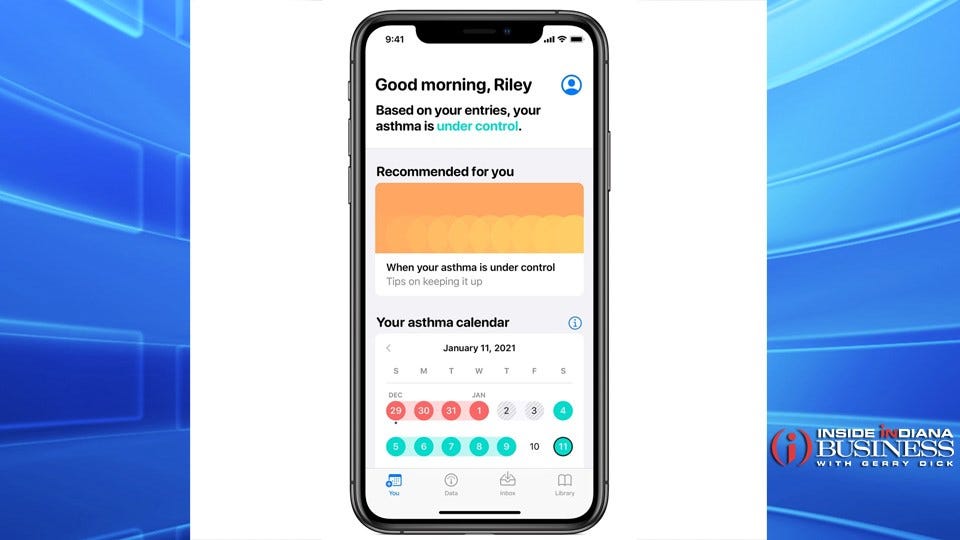Anthem Study: Could Apple Watch Improve Asthma?
 Half of the participants will use an asthma app that incorporates their biometric data collected from the watch and sleep monitor.
Half of the participants will use an asthma app that incorporates their biometric data collected from the watch and sleep monitor.
Subscriber Benefit
As a subscriber you can listen to articles at work, in the car, or while you work out. Subscribe NowWearables like the Apple Watch are giving people new insight into their health data, and now visionaries are exploring how these new tools could also be game changers in the healthcare industry. Indianapolis-based Anthem Inc. is launching a research study to determine if people with asthma—when armed with an Apple Watch and Beddit Sleep Monitor—can increase their self-management of the condition, and as a result, feel better and avoid costly visits to the ER.
“Asthma is considered to be a reversible inflammatory disease of the lungs. What that means is, if you take your medications regularly [to prevent and control your] asthma, you can actually be symptom-free for a lot of the time for mild to moderate persistent asthma,” says Anthem Digital Care Delivery Vice President Dr. Warris Bokhari. “So for a vast majority of cases, you can remain in control, which means you don’t have these bursts of asthma attacks that land you in the ER.”
However, studies have shown that less than 50% of people with asthma are controlling the condition well. The health insurance company wants to determine if giving people real-time insight about their asthma could help them manage it better by self-identifying triggers that might be impacting the condition, such as pollen, smoke, pets or medication adherence. Such a discovery could be hugely impactful; nearly 25 million Americans have some form of the condition and about 1.8 million ER visits each year are attributed to asthma.
The two-year study, led by the University of California, Irvine, is enrolling participants with Anthem-affiliated health plans and providing them with an Apple Watch and Beddit Sleep Monitor. Half of the participants will use a digital asthma app that incorporates their biometric data collected from the watch and sleep monitor. The app includes a daily symptom monitor, trigger tracking and “personalized nudges” based on changes the wearables detect, such as activity, heart rate or blood oxygen level, an added feature on the newest Apple Watch. The other half will have the watch and sleep monitor, but only limited access to the app to answer a survey at the start and one-year mark of the study.
“We’re also looking at subtle signs of change in asthma control; things like sleep disturbances often get forgotten by the time a patient [ends up in the ER],” says Bokhari. “They may not recall all the subtle clues, but their control has been slipping all the while. What’s remembered is the kind of the ‘Pompeii’ event of the asthma attack, and not all the little things along the way.”
The study is a partnership with Apple and is the first time Anthem has worked with the technology giant. Bokhari, an Apple alumni himself, says a core strength of the tech company is “experience: they really do understand their customer.” Likely not top of mind when one considers a health insurance company, “the experience for our constituents” is something Bokhari says Anthem is working to prioritize. Doing so, he believes, will move someone from being “at the whims of their disease” to having the tools to help manage it.
“When you look at the devices [Apple] puts out there—the iPhone and Apple Watch—and the quality of the sensors and engineering, you realize this is the real deal in terms of something consumers have, is very well distributed and where there could potentially be very large health benefits in the general population,” says Bokhari. “When you know all that and then understand some of the gaps we see emerging in healthcare, there are natural places to intersect, and this study is definitely one of them.”
While providing its plan members a more consumer-like experience, Anthem will also be creating “a very high level of evidence” to support digital therapy interventions, assuming the study shows positive results.
“[Asthma] has been a disease that doesn’t get a lot of attention,” says Bokhari, “and it’s one where we haven’t done a great job in producing lead indicators that people are getting sicker. So I think there’s a lot to do here.”
Bokhari says Anthem is approaching the 39 Medicaid expansion states to enroll study participants, as it’s “particularly interested in populations that disproportionately bear the burden of some of the healthcare challenges of today.” He notes Indiana has had “a great response,” so Hoosiers will be involved in the study.
“At Anthem, we recognize the increasing role that digital tools and wearables will play in healthcare,” says Bokhari. “The goal is to provide people with much greater insight into what’s happening with their bodies and the relative changes they experience—but also make that make sense to them, so they’re empowered and have agency over their disease. We’re hoping we can do this in the future in different conditions. This is really what we see as being the start point.”
Bokhari says the study can’t ignore the impact of COVID-19, so the second year will include analysis of participants’ asthma symptoms over time who were diagnosed with COVID-19.
Bokhari says the Apple Watch Series 6 is the first one to include a blood oxygen sensor, which could uncover how blood oxygen varies in people with asthma.
